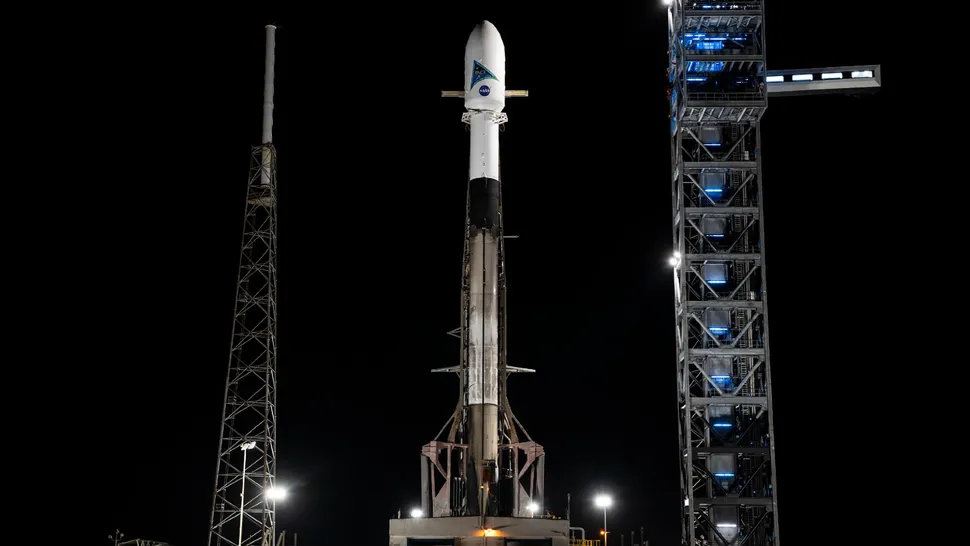
'Understanding how ocean life interacts with the atmosphere and the global climate is one of the secrets of the universe right here at home.'
「海洋生物が大気や地球の気候とどのように相互作用するかを理解することは、ここここにある宇宙の秘密の 1 つです。」
NASA's Plankton, Aerosol, Cloud, Ocean Ecosystem (PACE) satellite is set to depart Earth from Cape Canaveral Space Force Station on Wednesday (Feb. 7) at 1:33 a.m. EST (0633 GMT.) It will launch atop a SpaceX Falcon 9 rocket.
NASAのプランクトン・エアロゾル・雲・海洋生態系(PACE)衛星は、水曜日(2月7日)東部標準時午前1時33分(グリニッジ標準時06時33分)にケープカナベラル宇宙軍基地から地球を出発する予定で、スペースX社のファルコン9号の上で打ち上げられる予定だ。ロケット。
Launch had been planned for Tuesday (Feb. 6) at the same time, but bad weather forced a delay.
打ち上げは火曜日(2月6日)に同時に計画されていたが、悪天候のため延期を余儀なくされた。
Ahead of the launch, NASA and SpaceX experts gathered to discuss the impact the PACE mission will have on climate science as it monitors the interaction between Earth's oceans and atmosphere.
打ち上げに先立ち、NASAとSpaceXの専門家は、地球の海洋と大気の相互作用を監視するPACEミッションが気候科学に与える影響について議論するために集まった。
"Understanding how ocean life interacts with the atmosphere and the global climate is one of the secrets of the universe right here at home. Aerosols that cycle through the ocean and atmosphere are a factor in how clouds form and how weather systems behave," NASA Associate Administrator Jim Free said at a press conference on Monday (Feb. 5). "But exactly how that process works is a scientific mystery. Unraveling it is one big goal of the PACE mission in line of course with NASA's charge to explore the unknown in air and space."
「海洋生物が大気や地球の気候とどのように相互作用するかを理解することは、ここ本拠地である宇宙の秘密の1つです。海洋と大気中を循環するエアロゾルは、雲の形成方法や気象システムの動作の要因となります。」NASAアソシエイトジム・フリー管理者は2月5日月曜日の記者会見でこう語った。 「しかし、そのプロセスが正確にどのように機能するかは科学的な謎です。それを解明することは、航空と宇宙の未知の世界を探索するというNASAの任務に沿ったPACEミッションの大きな目標の1つです。」
Free added that PACE will join the two dozen NASA missions in orbit currently that collect vital data on Earth's land, ocean, atmosphere and ice. The mission's data will be used by scientists and policymakers to safeguard against the threat of global climate change.
フリー氏は、PACEが現在軌道上で地球の陸地、海洋、大気、氷に関する重要なデータを収集する24のNASAミッションに参加すると付け加えた。このミッションのデータは、地球規模の気候変動の脅威から身を守るために科学者や政策立案者によって使用されます。
PACE will study tiny things to make a big scientific impact
Also speaking at the press event, Director of NASA's Earth Science Division Karen St. Germain explained that PACE will use its vantage point to investigate tiny micro-organisms that play a huge role on Earth, microalgae called phytoplankton.
PACEは大きな科学的影響を与えるために小さなことを研究するまたプレスイベントで講演したNASA地球科学部門のディレクター、カレン・セント・ジャーメイン氏は、PACEはその有利な地点を利用して、地球上で大きな役割を果たす小さな微生物である微細藻類を研究すると説明した植物プランクトンと呼ばれます。
"Our Earth is a water planet. The surface of the Earth is covered 70% by oceans, and yet, in many ways, we know more about the surface of the moon than we do about our own oceans," St. Germain said. "Phytoplankton are at the base of the marine food chain. They serve our fisheries and the health of the oceans. They are also responsible for absorbing a tremendous amount of carbon dioxide through photosynthesis and converting that into oxygen in the atmosphere.
「私たちの地球は水の惑星です。地球の表面は 70% が海で覆われていますが、それでも、多くの点で、私たちは自分たちの海についてよりも月の表面についてよく知っています」とセント ジャーメイン氏は言いました。 「植物プランクトンは海洋食物連鎖の基礎にあり、私たちの漁業と海洋の健康に貢献しています。また、植物プランクトンは光合成によって膨大な量の二酸化炭素を吸収し、それを大気中の酸素に変換する役割も担っています。
"But they can also be toxic, and we need to know that, too."
「しかし、それらは有毒である可能性もあり、それについても知る必要があります。」
St. Germain added that PACE won't just be looking at tiny organisms in the oceans. It will also study tiny particles in the atmosphere called aerosols.
サン・ジャーメイン氏は、PACEは海洋の小さな生物だけを調査するわけではないと付け加えた。また、エアロゾルと呼ばれる大気中の小さな粒子も研究します。
"Aerosols play an enormous role in our weather, our air quality, and even our climate. They come from sources like dust flowing off the Sahara, wildfires, and even human activities, and they seed clouds that can grow into hurricanes coming across the Atlantic," St. Germain said. "But they also reflect a lot of the sun's energy. So, they play an important role in the long-term sustained stability of Earth's climate. Because we're measuring both of these things together, PACE will allow us to understand the strong interactions between the atmosphere and the ocean."
「エアロゾルは、私たちの天気、大気の質、さらには気候に大きな影響を及ぼします。エアロゾルは、サハラ砂漠から流れ出る砂塵、山火事、さらには人間の活動などの発生源からもたらされ、大西洋を横断するハリケーンに成長する可能性のある雲の種を生み出します。 」とセント・ジャーメインは言った。 「しかし、それらは太陽エネルギーの多くを反射するものでもあります。したがって、それらは地球の気候の長期にわたる持続的な安定に重要な役割を果たしています。私たちはこれら両方を一緒に測定しているので、PACEによって強い相互作用を理解することができます。」大気と海の間。」
The PACE launch will also be offering something a little bit different for typical NASA Cape Canaveral liftoffs.
PACEの打ち上げでは、典型的なNASAのケープカナベラル打ち上げとは少し異なるものも提供される予定だ。
"PACE is the eighth NASA LSP mission to launch on a SpaceX rocket, and the first government mission to fly a polar trajectory from the Cape since November of 1960," NASA Launch Services Program (LSP) Director Tim Dunn said. "Now, SpaceX is well seasoned in flying this particular trajectory. They've done it 11 times commercially since 2020."
NASA打ち上げサービスプログラム(LSP)ディレクターのティム・ダン氏は、「PACEは、SpaceXロケットで打ち上げられる8番目のNASA LSPミッションであり、ケープから極軌道を飛行する初の政府ミッションである」と述べた。 「現在、SpaceX はこの特定の軌道を飛行することに十分に慣れています。彼らは 2020 年以来、商業的に 11 回飛行を行っています。」
During the last Cape "polar launch," the blast-off of SOLRAD 2 and Transit 3A atop a Thor-Ablestar rocket on Nov. 30, 1960, a booster flew off course and rained debris over Cuba. After this, NASA's polar launches were moved to the Vandenberg Space Force, previously Vandenberg Air Force Base.
1960年11月30日、ソー・エイブルスター・ロケットに搭載されたソルラド2号とトランジット3Aがケープで行われた最後の「極地打ち上げ」の際、ブースターがコースを外れ、キューバ上空に破片の雨を降らせた。この後、NASA の極地打ち上げはヴァンデンバーグ宇宙軍、以前はヴァンデンバーグ空軍基地に移されました。
Plus, the launch of PACE has been a long time coming. The Trump administration proposed canceling PACE in all four of its NASA budget proposals, from fiscal years 2018 through 2021, but Congress kept the mission funded each year.
さらに、PACE の発売には長い時間がかかりました。トランプ政権は、2018年度から2021会計年度までのNASAの4つの予算案すべてでPACEを中止することを提案したが、議会はミッションに毎年資金を提供し続けた。
The Falcon 9 rocket with PACE attached was rolled out to the launch pad and erected at around 4 a.m. EST (0900 GMT) on Monday morning. Final preparations should begin at 10 p.m. EST (0300 GMT) tonight, with propellants set to be loaded at around 12:50 a.m. EST (0450 GMT).
PACEが取り付けられたFalcon 9ロケットは発射台まで繰り出され、月曜日の朝東部東部時間午前4時(グリニッジ標準時9時)頃に組み立てられた。最終準備は午後10時に開始する必要があります。今夜東部標準時間(0300 GMT)、推進剤は東部標準時午前12時50分(0450 GMT)頃に装填される予定です。
The PACE launch was supposed to happen early Tuesday morning (Feb. 6), but the weather didn't cooperate. There's a 60% chance of good weather for Wednesday's opportunity, according to U.S. Space Force Weather Officer Brian Cizek.
PACEの打ち上げは火曜日(2月6日)早朝に行われる予定だったが、天候に恵まれなかった。米国宇宙軍気象官ブライアン・シゼック氏によると、水曜日の天気が良くなる確率は 60% です。
The weather issues aren't dampening spirits at NASA for this important launch, however.
しかし、気象問題がこの重要な打ち上げに対する NASA の意気を弱めるわけではない。
PACE's "launch is not just a mission to space. It's a testament to our collective pursuit of knowledge, innovation, and the betterment of humanity for all Earthlings," Free concluded. "Go Falcon and go PACE."
PACEの「打ち上げは単なる宇宙への使命ではありません。これは、知識、革新、そしてすべての地球人のための人類の向上を私たちが集団的に追求していることの証です」とフリー氏は結論づけた。 「ファルコンに行って、ペースを上げてください。」
You can watch the PACE launch live here at Space.com, courtesy of NASA, or directly via the space agency's website
PACE の打ち上げは、NASA の厚意により Space.com でライブで視聴することも、宇宙機関のウェブサイトから直接視聴することもできます。
編集者注: この記事は 2 月 6 日午前 12 時 30 分に更新され、発売が 2 月 7 日に延期されるというニュースが伝えられました。


 DogeHome
DogeHome Inside Bitcoins
Inside Bitcoins CoinPedia News
CoinPedia News CoinPedia News
CoinPedia News CFN
CFN CoinPedia News
CoinPedia News Cointelegraph
Cointelegraph






















